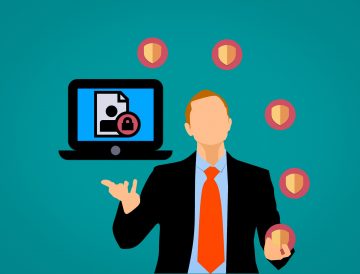6 Tips That Will Help You Manage Your Digital Footprint

On the face of it, the act of surfing the Internet involves clicking links, devouring information, and watching cat videos, mostly for free. Behind the scenes, however, quite a few more things are happening. You think that signing up for an account and logging in to it later on is no big deal, but what looks like a simple act means that information about you is sent to what we now often refer to as 'the cloud.' Even if you're not willingly giving away your personal data, websites and services track where you're located, what type of browser you're using, where you've been, and other information that is then used for a number of purposes. Put all this together, and you have a trove of data that represents your digital footprint.
The problem with data is that by its nature, it's not terribly secure. Obviously, it needs to be accessed by certain people, but thanks to the way the Internet works, if the good people can access it, the bad people will probably be able to view it as well. Data is hackable and everyone who tells you otherwise either doesn't know what they're talking about or has gotten a bit carried away with the marketing speak. So, what are the options, then?
The living-in-a-cave approach
You have probably heard old people complaining about technology and claiming that it will ruin all our lives. Well, in theory, you can join them and start every other sentence with "When I was young" followed by a rant about how good things were in the past.
Here's the thing, though – unless you are actually fairly old, your close ones will think that you're being a bit weird, especially when you swap your brand new smart TV for a black-and-white one. Life in the World Wide Web sure presents quite a few problems, but refusing to deal with them isn't really an option for many people. Getting to know what the issue is and resolving it is a much better bet.
Managing your data online
Data breaches happen every day, and for the most part, that's beyond your control. What you can do, however, is try to ensure that when your data ends up exposed, it will be of little use to the hackers. When it comes to your digital footprint – the smaller it is, the better. Today, we'll give you a few tips on what you can do to reduce it and keep it under control.
- Delete your old accounts.
No, you're not going to connect to your old schoolmates through MySpace because they've all forgotten that it exists. In addition to some probably embarrassing photos and posts, old social media accounts contain a great deal of personal information. And while your appearance and taste in clothes might have changed over the last ten years, your personal data hasn't.It's not just social media, either. Old emails could be used for spamming, especially if they're protected by a password which you thought up when you were back in school. You might have also opened an account at an online shop just to buy your significant other a present. That profile has been sitting dormant, but it still holds your data, so deleting it is a good idea. Any unused accounts can be abused in more ways than you think, so you must make sure that they, along with all the information you have put in them are deleted.In a desperate bid to keep as many subscribers as possible, some websites and services won't allow you to completely remove the account. In such cases, it's best to just log in and replace your personal details with fake information, preferably using something generic like John/Jane Doe for the name and gibberish for the address and phone number. After all, while you're trying to protect yourself, you must be careful not to put other people in trouble. - Limit the number of new accounts.
As we mentioned at the beginning of the article, you do most of the things on the Internet without paying a penny. Often, however, you don't need to pay money, but you do need to sign up for free. It's easy to just go for it, but it might not be a bad idea to stop and think about what will happen after you create the account. Will it improve the overall experience on the website? Or is it all nothing more than a data collection mechanism?If you decide that you do need the account, try not to storm through the signup process. Pay attention to the fields that are mandatory and leave the ones that are not empty. - Treat social media with respect.
Many people will tell you that by simply using social media, you have inadvertently put yourself in a world of trouble. Again, however, the social networks do have their strong points, and ditching them isn't the best option for most people. You have to be conscious of the risks they pose, though.Posting pictures of your cat is fine. Keeping in touch with old friends and relatives is great. Sharing every single detail of your life with the rest of the world, however, is a bad idea. First of all, make sure you review your Facebook and Twitter privacy settings. The two social networks give you a certain degree of control over what is and what isn't available for everyone to see, and you must take advantage of it. Then, you could do worse than comb through the list of people you're connected to. If you see profiles you don't know or trust, you could do worse than removing them from your connections or at least putting them in a list that limits the amount of information they see. - Use your browser's private mode.
There are plenty of misconceptions about how the browsers' private or incognito modes work. Many people wrongly assume, for example, that browsing incognito stops evil governments from tracking you. It can't do that. People also think that incognito mode prevents websites from seeing their IPs and thus determining their location. This, again, is not true.Contrary to popular belief, the incognito mode doesn't guarantee anonymity. What it does instead is it disables browsing history when it's on so that you (or someone else with physical access to the computer) can't see which websites you've visited during the private session. It also prevents websites from dropping cookies on your PC.Cookies are important. For example, thanks to them, you don't need to log in to your Facebook account every time you decide to see what your friends have shared. Unfortunately, these small strings of text are used for other purposes as well. By looking at the cookies saved on your device, websites can see what sort of content you've been viewing, and in some cases, they will relay this data to advertisers who will bombard you with ads you might not necessarily want to see. - Hit the Unsubscribe button.
What do you do when you get a letter you're not interested in through the snail mail? You throw it away, of course. But when the message arrives via email, you've got another option.Many people (in many cases, without even realizing it) subscribe to different newsletters and are subsequently inundated with messages they're not interested in. In addition to the clutter in the inbox, this presents another problem. Being subscribed to a newsletter means that your email address will be put in a list which will be stored in the cloud. Stolen mailing lists can be used for a wide variety of scams and spam campaigns, and having your address posted in as fewer places as possible is bound to not only protect you from many different cyberattacks but also to improve your overall online experience. - Google yourself.
Yes, it sounds like something only vain people would do, but you should definitely consider it. Google is the Internet's biggest source of information, and it's the most reliable way of seeing how much of your personal data is online. What's more, you will be able to contact website owners who are publicizing your information and ask them to stop. Google itself gives you a few options to remove the data from the public eye as well. Indeed, deleting information about yourself from the World Wide Web is a challenge sometimes, but this doesn't mean that you should give up and not bother with it at all.
You can't get away from the fact that by using the vast networks of computers and devices called the Internet, you will leave a trail of information behind, and you can't get away from the fact that bad people will want to get their hands on that information. If you are a bit more careful, however, you can ensure that if they successfully steal it, there won't be too much they can do with it.








